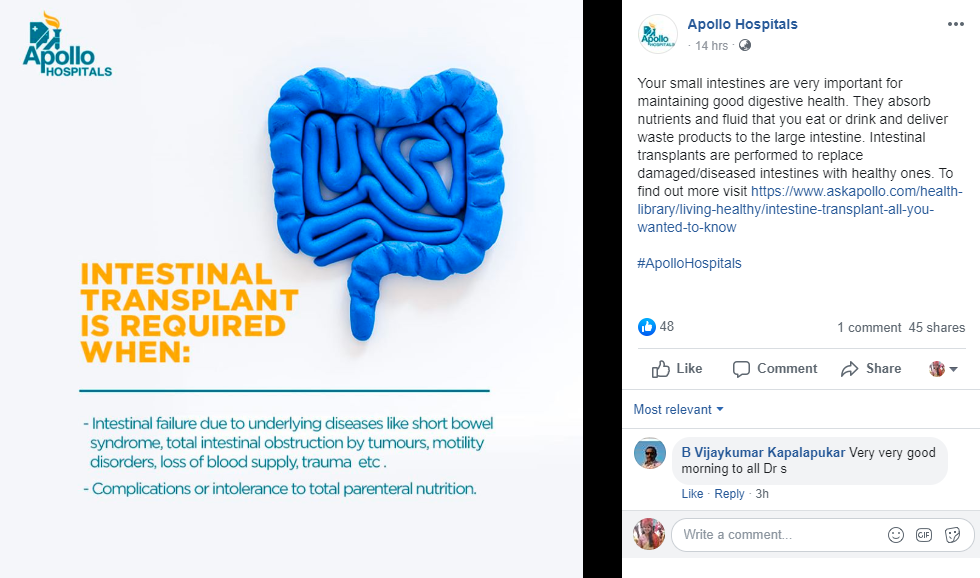Did you know that there are 468,898 hospitals in India? And this is just the government-run hospitals. The number would be much higher if you start including the private sector ones as well. According to the IBEF, the market can increase three-fold to Rs. 8.6 trillion (US 133.44$ billion) by 2022. But, how is this related to hospital leads?

With the Indian population slowly prioritizing their health, the healthcare industry is rapidly on the rise. Especially, private hospitals. With the Indian government encouraging the ‘Startup’ culture, an array of healthcare services have popped up.
But, how do you match your services with the right patients? In this article, let’s try to decode the mantra for generating high-quality hospital leads.
What are Hospital Leads?
Before you devise your hospital lead generation strategy, let’s take a look at what constitutes a lead for your hospital or clinic. Any person who comes in contact with you, both offline or online, with the intention to avail of your services is a lead.
But, how do you get leads to come to you? The numbers I quoted at the beginning of this article tells you just how stiff the competition has become. And it isn’t slowing down anytime soon.
So, let’s move on to…
Tips to Generate High-Quality Hospital Leads
Being aware of your health and taking the right precautions to improve it is a conscious choice that not many people make. They either ignore what their body is telling them, or they simply are not aware enough to avail the right healthcare.
That is the gap that you, as a health care provider, should be trying to bridge. You need to ensure that your target audience is well informed and aware of you and your offerings. The best way is for you to go to where they are and provide gentle nudges.

1. Leverage content marketing
You are familiar with the saying “content is king”, right? That’s because it works. And, if you do it right, it can bring in quality leads for a long period of time. But, what kind of content should you create?
Website:
Your website is the go-to place for all of your leads. Investing in building a good, well-structured website will be worth it in the long run. Ensure that your website is built following SEO guidelines. This improves your discoverability as well.
Some things to keep in mind while building your website:
- Have a clear goal in mind
- Ensure that you answer the question of ‘why’
- Make your site easily navigable
- Use images to tell a story
- Add relevant CTA, exit pop-ups, widgets, etc., o every page
- Use simple and concise language
- Update your website regularly
You can even have a health blog where you can update articles on improving your patients’ health and lifestyle to slowly build a list of followers.
Webinars and Podcasts
You can talk to leading doctors and health professionals in your field of specialization and share their learnings and insights with your audience. Choose topics that might the most common ailment of your target segment.
Upload these videos on channels such as YouTube or SoundCloud.
Social Media
You cannot ignore this popular channel. Social media is everywhere and each year brings in a new platform for a different audience segment. Before you create your various social media profiles, ensure that you do your research to find where your target audience is.

For example, if you are a women’s health clinic, you need to be on Facebook and join groups where women are more likely to be present – like lifestyle and health-related groups.
Post helpful content, such as tips, home remedies, or symptoms to look out for. Engage with communities and remember the golden rule – never spam.
2. Optimize for search engines
All the content that you create might go for a toss if no one is able to find you. Which is why you should always create content that is SEO friendly. Invest time in understanding what the best SEO practices are for the healthcare industry.
The most important step in SEM/SEO is having a strong keyword bucket. Use tools like SEMrush, Moz, or Google’s Keyword Planner to know what your audience searches for. Use these keywords to build content.
Protip: If you want Google to like you, ensure that you make your customers like your content. Make it easy to read, helpful and easily shareable. This will definitely help you push your own rankings.
3. Do local SEO
Most people simply google the nearest hospital in case of an emergency. Or even if they need to make a meditated appointment, they would mostly rely on Google again. To ensure that you appear in these searches, you need to ensure that your business is compliant with the local SEO rules.
So, what should you do? First things first, register your business on Google My Business. Add your hospital address and working hours and get yourself verified. Ensure that you use relevant keywords. If you are a pediatric clinic, then you need to mention that. This will help you appear on relevant searches and increase the probability of getting quality leads.
4. Advertise online
There are a plethora of online ad options available now. Right from Google’s AdWords, to Facebook, LinkedIn, and Twitter, everyone allows you to run paid campaigns. Ads are all about experimentation. You need to test various platforms, ad copies, images, offerings, etc to figure out what works. (Plug: Pssst….. here is a webinar on PPC hacks that our in house experts have put together)
Running ads alongside your organic content has the potential to push your rankings even higher.
5. Use Traditional Advertising
While catering to the modern audience, do not forget the old fashioned audience who still read newspapers and listen to the radio. Keep aside a fraction of your budget to run promotions on these platforms as well.
Though it might be difficult to attribute ROI to these media, it is still recommended to have a presence here. If not anything else, they increase brand recall value significantly in the minds of your audience.
6. Network Offline
Just because you have built a strong online presence does not mean that you should stop interacting offline. Attend various healthcare events to build connections within your community. Build relationships with doctors and incentivize them to recommend your hospital or clinic to their patients.
Though it is a bit morbid, the majority of patients for any hospital are people who are over 50 years of age. It would be wise for you to go to locations where they frequent – such as religious spots, parks, or markets. Create a sense of awareness so that if and when the need arises, they’d think of you first.
7. Answer questions on forums
Be present on Q&A platforms such as Quora or drugs.com. Answer medical questions or even just queries asked out of curiosity. Being helpful and educational is the best way to stay on top of people’s minds. Keep sharing your knowledge or link them to the relevant content that you have created.
8. Be present on hospital lead sites
Practo has revolutionized the healthcare industry by allowing people to easily access and book appointments with doctors near them. Listing your doctors with varied specializations in the respective field would make your brand easily discoverable.
In conclusion
Maybe hospital lead generation was not that easy earlier. But, now, with a stronger understanding of technology and a growing awareness of the importance of health, it has become less complex.
We have already covered how you can do this. Follow these steps and you can have yourself a steady inflow of quality leads. But, how will you manage them? Try using a good hospital CRM like LeadSquared. You can try the healthcare CRM tool yourself and see how it works!
FAQs
Prioritize patient privacy. Comply with regulations like HIPAA (US) or India’s Information Technology Act (ITA) when collecting and managing patient data. Clearly outline your data privacy practices on your website and obtain explicit consent before collecting any personal information from potential patients.
Personalize your follow-up approach. Avoid generic messages. Acknowledge the patient’s specific needs or concerns mentioned during their initial inquiry. Offer valuable resources or information related to their potential health issue. Demonstrate empathy and expertise to build trust and encourage patients to choose your hospital for their healthcare needs.
Develop patient engagement strategies to nurture relationships and encourage referrals. Offer loyalty programs or educational resources relevant to their health conditions. Collect feedback and address patient concerns to cultivate positive word-of-mouth marketing and potentially convert satisfied patients into advocates for your hospital.








